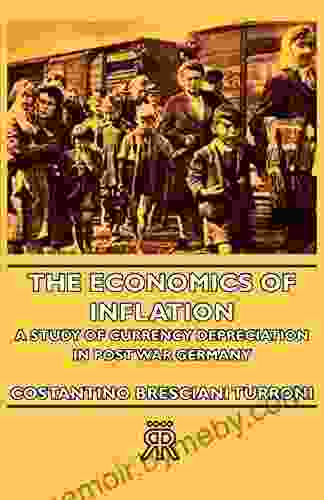The Economics of Inflation: A Study of Currency Depreciation in Post-War Germany

Inflation is a general increase in prices and fall in the purchasing value of money. It can be caused by a number of factors, including an increase in the money supply, a decrease in the supply of goods and services, or an increase in demand.
4.2 out of 5
| Language | : | English |
| File size | : | 5106 KB |
| Text-to-Speech | : | Enabled |
| Screen Reader | : | Supported |
| Enhanced typesetting | : | Enabled |
| Word Wise | : | Enabled |
| Print length | : | 550 pages |
Inflation can have a number of negative consequences, including:
* A decrease in the value of savings * An increase in the cost of living * A decrease in economic growth * Social unrest
In the case of post-war Germany, inflation was a major problem. The German economy was devastated by the war, and the government was forced to print money to finance its reconstruction efforts. This led to a rapid increase in inflation, which peaked at over 1,000% per year in 1923.
The effects of inflation in post-war Germany were devastating. The value of savings was wiped out, the cost of living skyrocketed, and economic growth was stifled. The inflation also led to social unrest, and contributed to the rise of the Nazi Party.
The Causes of Inflation in Post-War Germany
There were a number of factors that contributed to inflation in post-war Germany, including:
* The increase in the money supply: The German government printed money to finance its reconstruction efforts. This led to an increase in the money supply, which in turn led to inflation. * The decrease in the supply of goods and services: The German economy was devastated by the war, and the supply of goods and services was severely reduced. This led to an increase in prices, which in turn led to inflation. * The increase in demand: The German people were eager to rebuild their lives after the war, and this led to an increase in demand for goods and services. This increase in demand also contributed to inflation.
The Effects of Inflation in Post-War Germany
The effects of inflation in post-war Germany were devastating, including:
* The decrease in the value of savings: The value of savings was wiped out by inflation. This led to widespread poverty and hardship. * The increase in the cost of living: The cost of living skyrocketed as a result of inflation. This made it difficult for people to afford basic necessities. * The decrease in economic growth: Inflation stifled economic growth. This was due to the fact that businesses were reluctant to invest in an economy with high inflation. * The social unrest: Inflation led to social unrest. This was due to the fact that people were angry about the loss of their savings and the increase in the cost of living.
Policy Recommendations for Preventing and Mitigating Inflation
There are a number of policy recommendations that can be made for preventing and mitigating inflation, including:
* Controlling the money supply: The government can control the money supply by raising interest rates or selling bonds. This will reduce the amount of money in circulation, which will help to prevent inflation. * Increasing the supply of goods and services: The government can increase the supply of goods and services by investing in infrastructure and education. This will help to reduce prices, which will help to prevent inflation. * Decreasing demand: The government can decrease demand by raising taxes or reducing government spending. This will reduce the amount of money that people have to spend, which will help to prevent inflation.
Inflation is a serious economic problem that can have devastating consequences. The German experience in the post-war period is a cautionary tale about the dangers of inflation. There are a number of policy recommendations that can be made for preventing and mitigating inflation. By following these recommendations, governments can help to ensure that inflation does not become a problem in the future.
4.2 out of 5
| Language | : | English |
| File size | : | 5106 KB |
| Text-to-Speech | : | Enabled |
| Screen Reader | : | Supported |
| Enhanced typesetting | : | Enabled |
| Word Wise | : | Enabled |
| Print length | : | 550 pages |
Do you want to contribute by writing guest posts on this blog?
Please contact us and send us a resume of previous articles that you have written.
 Book
Book Novel
Novel Page
Page Chapter
Chapter Text
Text Story
Story Genre
Genre Reader
Reader Library
Library Paperback
Paperback E-book
E-book Magazine
Magazine Newspaper
Newspaper Paragraph
Paragraph Sentence
Sentence Bookmark
Bookmark Shelf
Shelf Glossary
Glossary Bibliography
Bibliography Foreword
Foreword Preface
Preface Synopsis
Synopsis Annotation
Annotation Footnote
Footnote Manuscript
Manuscript Scroll
Scroll Codex
Codex Tome
Tome Bestseller
Bestseller Classics
Classics Library card
Library card Narrative
Narrative Biography
Biography Autobiography
Autobiography Memoir
Memoir Reference
Reference Encyclopedia
Encyclopedia Bethany Griggs
Bethany Griggs Alfred Edersheim
Alfred Edersheim Amarie Avant
Amarie Avant Ally Carter
Ally Carter Michael J Epstein
Michael J Epstein Amanda Claridge
Amanda Claridge Amy Butcher
Amy Butcher Alinka Rutkowska
Alinka Rutkowska Bruce Schoenfeld
Bruce Schoenfeld Alicia Klepeis
Alicia Klepeis Alexis Dubief
Alexis Dubief Alexandra Sirowy
Alexandra Sirowy Alice Gorman
Alice Gorman Alexander William Kinglake
Alexander William Kinglake Alicia Puglionesi
Alicia Puglionesi Lisa Marie Rice
Lisa Marie Rice Glen Simmons
Glen Simmons Ram Oren
Ram Oren Alissa Quart
Alissa Quart Amby Burfoot
Amby Burfoot
Light bulbAdvertise smarter! Our strategic ad space ensures maximum exposure. Reserve your spot today!

 Steven HayesTruth, Lies, and Rings: A Literary Masterpiece That Explores the True Nature...
Steven HayesTruth, Lies, and Rings: A Literary Masterpiece That Explores the True Nature...
 Samuel Taylor ColeridgeUnleashing the Power of Light: A Comprehensive Guide to Stage Lighting Design
Samuel Taylor ColeridgeUnleashing the Power of Light: A Comprehensive Guide to Stage Lighting Design Greg FosterFollow ·7.5k
Greg FosterFollow ·7.5k Vincent MitchellFollow ·13.3k
Vincent MitchellFollow ·13.3k Isaac AsimovFollow ·10.7k
Isaac AsimovFollow ·10.7k William ShakespeareFollow ·3.3k
William ShakespeareFollow ·3.3k Christian CarterFollow ·19k
Christian CarterFollow ·19k Vladimir NabokovFollow ·19.8k
Vladimir NabokovFollow ·19.8k Graham BlairFollow ·19.8k
Graham BlairFollow ·19.8k Reed MitchellFollow ·13.8k
Reed MitchellFollow ·13.8k

 Robert Reed
Robert ReedConservation Habitat Changes And The Rise Of Urban...
As urban areas continue to expand, wildlife...

 W. Somerset Maugham
W. Somerset MaughamRide the Waves: The Ultimate Guide to Surfing Indonesia...
Are you ready to embark on an unforgettable...

 Arthur Conan Doyle
Arthur Conan DoyleThe Widow, the Priest, and the Octopus Hunter: A Literary...
Prologue: A Tapestry...

 Fernando Bell
Fernando BellRide the Waves of Adventure: The Ultimate Guide to...
Unveiling the Surfing Paradise of Peru For...
4.2 out of 5
| Language | : | English |
| File size | : | 5106 KB |
| Text-to-Speech | : | Enabled |
| Screen Reader | : | Supported |
| Enhanced typesetting | : | Enabled |
| Word Wise | : | Enabled |
| Print length | : | 550 pages |












